Forced to Work for FoodShare
Is GOP legislation “life changing” or a waste of taxes? Hard to say since Walker vetoed study of program.

Bianca Shaw likened Wisconsin’s FoodShare Employment and Training program requirements to “slave labor” during a press conference at the Wisconsin state Capitol on Jan. 31, 2018. She was speaking out against a package of special session bills on welfare that have since been enacted. Shaw spoke about the difficulty of trying to support herself and her daughter Olivia on a low wage, and said she stopped her voluntary participation in FSET because it required 80 hours a month of work or job searching to earn $600 in FoodShare benefits. Photo by Coburn Dukehart/Wisconsin Center for Investigative Journalism.
Jim McLaughlin is an instructor at Just Bakery, located in a one-story brick building on Madison’s East Side. McLaughlin, a burly man in a white apron, works for a program that partners with Dane County to help unemployed people earn college credit and certification as commercial bakers.
McLaughlin said the goal of Just Bakery is not necessarily to churn out more bakers. Instead, his mission is to train people to hold down a job.
“Our goal is to have people who can come to work and be a contributing member of the workplace on day one,” he said during a recent tour of the facility as trainees scooped and hand-pressed almond-flavored sugar cookies onto giant baking sheets.
For some, participation has another important benefit: It qualifies them to keep receiving government food assistance.
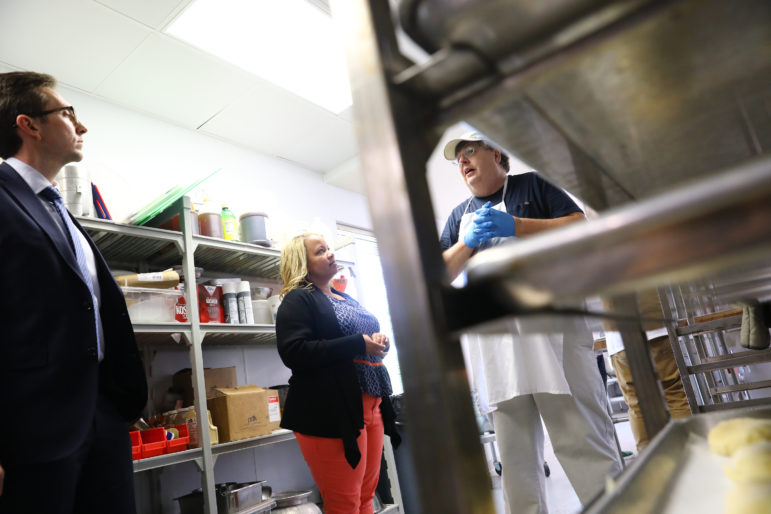
Brandon Lipps, acting deputy undersecretary of the U.S. Department of Agriculture, meets with Carmella Glenn, Just Bakery program coordinator, and Jim McLaughlin, an instructor, on June 5, 2018, in Madison, Wis. Beginning in 2019, Wisconsin will require able-bodied FoodShare recipients with children ages 6 and above to work, look for a job or participate in training. Programs such as Just Bakery help participants meet that requirement. Photo by Coburn Dukehart/Wisconsin Center for Investigative Journalism.
Beginning next year, programs like Just Bakery will increasingly be in demand as parents of children ages 6 and above in Wisconsin will be added to the list of able-bodied recipients ages 18 through 49 required to train for a job or work to earn FoodShare benefits. Currently, parents with dependents are exempt from the requirement.
And the required number of hours for Wisconsin FoodShare recipients will increase from 20 hours a week to 30, pending approval from the federal government. Children would retain their benefits, but parents who fail to meet the new requirements would not.
The expansion is expected to double the cost of the program. Adding able-bodied parents to the work requirement is estimated to cost an additional $54.7 million a year, not including $5.8 million in startup costs. Currently, the program costs about $49.5 million a year, according to the Legislative Fiscal Bureau.
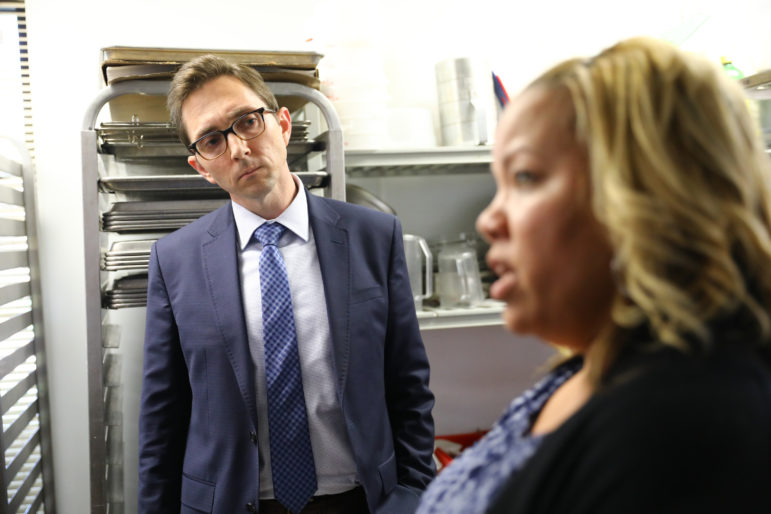
Brandon Lipps, acting deputy undersecretary of the U.S. Department of Agriculture, meets with Carmella Glenn, Just Bakery program coordinator, on June 5, 2018, in Madison, Wis. Just Bakery is a 16-week educational and vocational training program that works with people who have barriers to employment including homelessness, criminal history, mental health problems or lack of transportation. Some of the trainees participate to keep government food assistance, known as FoodShare. Photo by Coburn Dukehart/Wisconsin Center for Investigative Journalism.
On the tour of Just Bakery was Brandon Lipps, acting deputy undersecretary of the U.S. Department of Agriculture’s Food, Nutrition and Consumer Services, which runs the national Supplemental Nutrition Assistance Program. He said policymakers in Washington, D.C., are keenly interested in how states are reducing public assistance by requiring and helping people to find work.
Wisconsin is one of 17 states that have fully implemented a federal work and training requirement to receive food assistance. The rest of the states either have a partial or full waiver of the requirement, which was enacted in 1996.
Congressional Republicans are seeking to prompt more states to enforce those work requirements and, in some ways, go beyond what Wisconsin plans to do. The House on June 21 passed the 2018 Farm Bill on a narrow, largely party-line vote with all Democrats opposed.
It would expand the 20-hour-a-week national requirement for able-bodied recipients to include parents of school-age children and those up to age 60. The Senate version does not contain the work requirement changes, and the two houses will need to work out the differences before a Sept. 30 deadline.
Wisconsin’s program controversial
Is Wisconsin’s program working? Gov. Scott Walker says yes.
“Our investment in the FoodShare Employment and Training (FSET) program is an investment in our people, so that everyone who wants a good job, can get a good job, regardless of challenges in their present or their past,” Walker said in a statement in mid-June.
Advocates for the poor have argued that Wisconsin’s FoodShare work requirement — reinstated in 2015 for the first time since 2002 — has hurt more people than it has helped.
At a cost of $4,000 a person, the 16-week Just Bakery program run by the nonprofit Madison-area Urban Ministry is far more expensive than providing food assistance. According to the USDA, the average FoodShare recipient in Wisconsin gets $105.63 per month.
Half of the funding for Just Bakery comes from the federal government and the other half from money raised by the program, including grants and sales of baked goods.
Many of the 60 FSET participants Just Bakery trains each year have significant barriers to employment, including criminal histories, homelessness, mental health problems or lack of transportation, said Carmella Glenn, the program’s coordinator. FSET pays directly for some costs, such as transportation.
“Most of the people on FoodShare want to get out of FoodShare,” Glenn said. “They want to elevate and find employment. … If we take the proper steps, we can make sure they never have to get FoodShare again.”
Work requirements expand
Since 2015, able-bodied FoodShare recipients in Wisconsin between the ages of 18 and 49 who have no minor children at home have been required to work, search for jobs or engage in occupational training at least 20 hours a week or lose their benefits after three months.
Starting Oct. 1, 2019, this requirement will extend to parents with children ages 6 and above. And all able-bodied recipients ages 18-49, including parents with school-age children at home, will be required to spend at least 30 hours a week at job-related activities to maintain their benefits.
FSET is open to all FoodShare recipients regardless of whether they are subject to the work requirement.
Walker and legislative Republicans say the expanded work requirements for FoodShare recipients, passed during a special session in January and February, will preserve benefits for the truly needy and provide opportunities for the unemployed. Opponents, including many Democrats, argue the state should provide more support, not less, for people who are poor.
Overall, Wisconsin’s FoodShare program cost $867 million in 2017, paying benefits to about 682,000 people each month — a number that has steadily decreased in recent years as the state and national economies have rebounded.
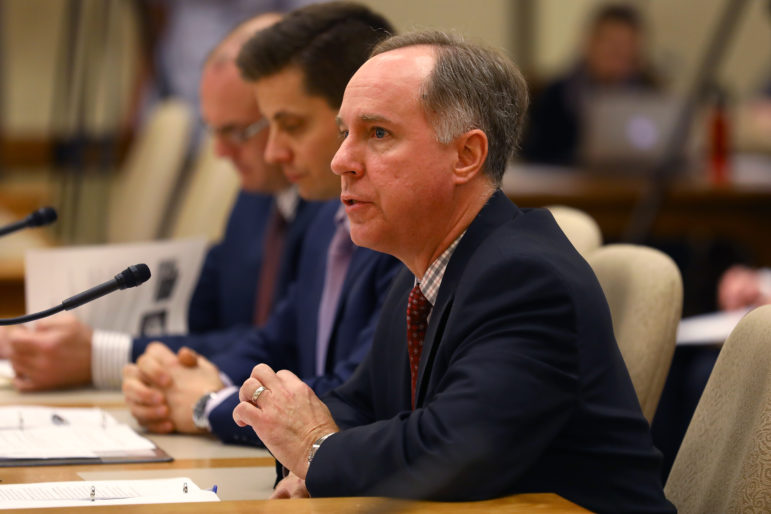
Assembly Speaker Robin Vos, R-Rochester, speaks during a Jan. 31, 2018 hearing at the state Capitol on a package of welfare bills as part of a special session of the Wisconsin Legislature. Vos said the changes are needed because “public assistance was never intended to be permanent.” Photo by Coburn Dukehart/Wisconsin Center for Investigative Journalism.
“Public assistance was never intended to be permanent, and this package will help us do our part in moving more people into the workforce and preventing fraud and abuse,” Assembly Speaker Robin Vos, R-Rochester, testified at the public hearing for the nine welfare bills passed during the special session.
The Heartland Institute, a free-market think tank based in Arlington, Ill., praised passage of the bills, which it took credit for inspiring.
“Congress and states followed Wisconsin’s lead in the 1990s when Gov. Tommy Thompson signed similarly groundbreaking welfare reforms,” said John Nothdurft, Heartland’s director of government relations. “The states should once again look to Wisconsin as a model for innovative welfare reforms that will help move people from government dependency to self-sufficiency.”
Democrats opposed most of the changes. State Rep. Lisa Subeck, D-Madison, said the bills “do nothing to address the needs of hardworking Wisconsin families who are living paycheck to paycheck and struggling to make ends meet.”
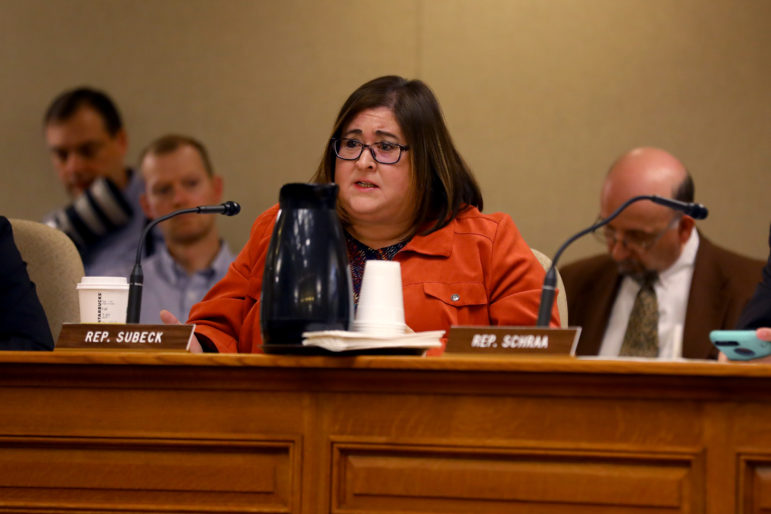
State Rep. Lisa Subeck, D-Madison, speaks in opposition to a bill that expanded work requirements for recipients of FoodShare in Wisconsin. Rather than work requirements, Subeck said Republicans who run the Legislature should “increase access to transportation and childcare, expand education and job training opportunities, and raise wages.” Photo by Coburn Dukehart/Wisconsin Center for Investigative Journalism.
“If Republicans were serious about helping working families,” she added, “they would increase access to transportation and childcare, expand education and job training opportunities, and raise wages.”
Glenn, from Just Bakery, does question whether the state and nonprofits such as hers will have the capacity to meet the needs of parents with children next year. Providing child care is expensive, she said.
“I’m a little worried as we get into opening this up to, for instance, the mother whose children are in school, are we holistically taking care of all their needs then so we’re not setting them up for failure?” Glenn asked in an interview. “Do they have the tools and do we have the tools to make that (success) happen? How far are we willing to go?”
The state’s FoodShare director, Rebecca McAtee, said currently, FSET pays for up to 90 days of child care for working parents. She said DHS is working with the Department of Children and Families to figure out a way to provide more help once the new requirements kick in.
Working, but still poor
According to DHS, people who found work under FSET now earn an average of $13.02 an hour, with the number of weekly hours worked 34.9.
That means the typical FSET participant earns $23,629 a year — or less than the $24,120 a year gross income that qualifies a single person to receive FoodShare benefits. In other words, the typical FSET participant still qualifies for FoodShare.
McAtee said most of the FoodShare recipients who found work are in entry level jobs and “we’re really hoping that people are able to advance in their careers and that this is just a starting place for some people.”
In addition, many more recipients have lost FoodShare benefits than gained jobs after the work requirement took effect. DHS reports that recipients had “timed out” of the program 91,109 times as of March 31— meaning they had failed to meet work or training requirements during three months over a three-year period.
With the state’s unemployment rate at a historically low 2.8 percent, there are jobs available. But Lund said some recipients who want to work face barriers, such as criminal history or discouragement, that keep them from landing a job.
“If these people never get that help, then how do we ever get them on the track to the life that everybody wants?” she asked.
No state evaluation of FSET
Walker vetoed a measure passed by the Legislature in the 2017-19 budget that would have required the state to evaluate FSET. In his veto message, Walker said he eliminated the requirement because, “I object to requiring an evaluation of this provision before it can be expanded.”
That makes it difficult to figure out how well the program is working, the Legislative Fiscal Bureau found.
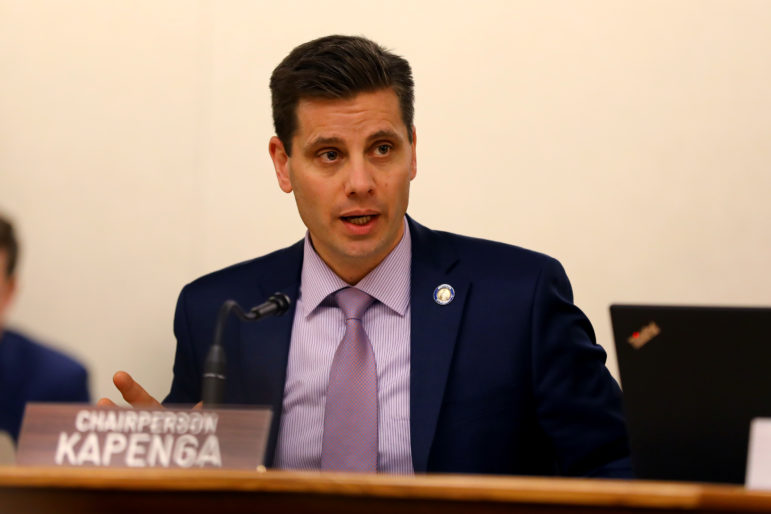
State Sen. Chris Kapenga, R-Delafield, testifies in favor of a bill that expands the work requirement for FoodShare recipients to include parents of children ages 6 and above, saying the mandate will “help get people off the sidelines and into the workforce.” Critics say the existing requirement for able-bodied adults with no minor children has hurt more recipients than it has helped. Photo by Coburn Dukehart / Wisconsin Center for Investigative Journalism.
“For example, it is not known how many of the individuals … would have gained employment without participating in the FSET program, how many individuals received full-time jobs rather than part-time jobs, or how many individuals found jobs with earnings that enabled them to no longer qualify for public assistance programs, including FoodShare,” the agency said in a 2017 paper.
A 2018 report by graduate students at the University of Wisconsin-Madison’s LaFollette School of Public Affairs found that absent significant investments by the state, such an evaluation would be very difficult.
“DHS does not currently possess the data or evaluation framework needed to make causal claims regarding the FSET program’s impacts on participant employment and earnings at a program level or at an individual component level,” according to the report prepared at DHS’ request.
Life changing or ‘slave labor?’
Critics have complained that some recipients receive little meaningful training or promised individualized assessments to help them secure work. FSET is run by a network of seven vendors, including county human service agencies, nonprofits and one for-profit company, ResCare, based in Louisville, Kentucky.
Some clients of ResCare say they were offered generic online courses or assigned endless job searches, according to a series of complaints filed by Legal Action of Wisconsin about the company, which operates FSET in Kenosha, Milwaukee, Ozaukee, Racine, Walworth, Washington and Waukesha counties.
McAtee said the state’s on-site visits to ResCare in 2017 and 2018 turned up only minor problems, and “I don’t believe that ResCare has any open, active issues.”
Bianca Shaw of Milwaukee said she stopped her voluntary participation in FSET because it required 80 hours a month of work or job searching to earn $600 in FoodShare benefits. “That’s slave labor,” she said.
Instead, Shaw got a job at a Milwaukee social-service agency. But she said the cost of child care for her daughter, Olivia, health insurance, food, utilities and rent consume her paycheck each month.
Speaking at a Capitol press conference in January, Shaw, a former legislative aide, said people like her would not need public assistance if the state provided better mass transit to get to and from work and made Wisconsin employers pay “a decent wage.”
“Reaching self-sufficiency,” Shaw said, “is a struggle I face every day.”

Tyrees Scott, a graduate of the Just Bakery program, talks about how it changed his life during a tour with Brandon Lipps, acting deputy undersecretary of the U.S. Department of Agriculture, which runs the national food assistance program. Photo by Coburn Dukehart / Wisconsin Center for Investigative Journalism.
But for Tyrees Scott, participating in FSET has been life-changing. The 47-year-old said he had a hard time finding work after being sent to prison “more than a couple of times.” He completed the training at Just Bakery and now works at another Madison bakery. FSET paid for transportation, which helped him finish the course.
Scott said he learned to cook in prison. But Just Bakery taught him more than that.
“Not only do they teach you a skill, a bakery skill, but also life skills,” Scott said. “The program I think is real beneficial, once I made the decision to get my life together.”
The nonprofit Wisconsin Center for Investigative Journalism (www.WisconsinWatch.org) collaborates with Wisconsin Public Radio, Wisconsin Public Television, other news media and the UW-Madison School of Journalism and Mass Communication. All works created, published, posted or disseminated by the Center do not necessarily reflect the views or opinions of UW-Madison or any of its affiliates.
-
Legislators Agree on Postpartum Medicaid Expansion
 Jan 22nd, 2025 by Hallie Claflin
Jan 22nd, 2025 by Hallie Claflin
-
Inferior Care Feared As Counties Privatize Nursing Homes
 Dec 15th, 2024 by Addie Costello
Dec 15th, 2024 by Addie Costello
-
Wisconsin Lacks Clear System for Tracking Police Caught Lying
 May 9th, 2024 by Jacob Resneck
May 9th, 2024 by Jacob Resneck




















